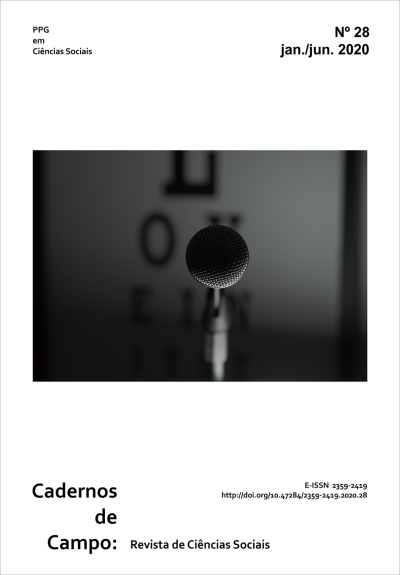Populism and fake news in a post truth era: comparisons between United States, Hungary and Brazil
DOI:
https://doi.org/10.47284/2359-2419.2020.28.385412Keywords:
Populism, Post-truth, Public opinion, Elections, Fake news,Abstract
In the latest elections many populists’ figures and right-wing extremists got elected or became stronger worldwide. It is well known that crises facilitate the concentration and abuse of power, once citizens are more likely to tolerate and support authoritarian measures. It is known that not all populist governments are the same, in this paper we seek to investigate the public opinion and the political culture of each population that elected those populist leaders in Brazil, the USA and Hungary. First, we discuss the political background of each country, as well as the profile of the leaders and their usage of fake news during the campaign. Second, we assess public opinion, political culture of the population for the last two electoral years in each country. In the third and last part, we draw comparisons between these three countries observing changes in the digital political scenario, based on the indexes of the V-Dem Institute (Varieties of Democracy) 2019.
Downloads
References
ABRANCHES, Sérgio. Polarização radicalizada e ruptura eleitoral. In: AUTORES, Varios (Ed.). Democracia em risco? 22 ensaios sobre o Brasil de hoje. [s.l.] : Companhia das Letras, 2019. p. 9–46.
ALLCOTT, Hunt; GENTZKOW, Matthew. Social Media and Fake News in the 2016 Election. Journal of Economic Perspectives, Cambridge, MA, v. 31, n. 2, p. 211–236, 2017. Disponível em: <http://www.nber.org/papers/w23089.pdf> Acesso em: 13 de mai. 2020
APPLEBAUM, Anne. 100 Years Later, Bolshevism Is Back. And We Should Be Worried. 2017. The Washington Post [on-line] Disponível em: <https://www.washingtonpost.com/opinions/global-opinions/bolshevism-then-and-now/2017/11/06/830aecaa-bf41-11e7-959c-fe2b598d8c00_story.html.> Acesso em: 11 de mai. 2020.
ARNAUDO, Dan. Computational Propaganda in Brazil: Social Bots during Elections. Computational Propaganda Research Project, [s. l.], v. 8, p. 1–39, 2017.
ASH, Timothy Garton. Europe must stop this disgrace: Viktor Orbán is dismantling democracy. The Guardian, [on-line], 2019. Disponível em: <https://www.theguardian.com/commentisfree/2019/jun/20/viktor-orban-democracy-hungary-eu-funding>. Acesso em: 8 jul. 2019.
ATKINSONS, Simon; SKINNER, Gideon. What worries the world - September 2018 IPSOS. [on-line]. Disponível em: <https://www.ipsos.com/en/what-worries-world-september-2018>. Acesso em: 30 abr. 2020.
BAQUERO, Marcello. Formas alternativas de participação política ou naturalização normativa? Cultura política e capital social no Brasil. Política & Sociedade, Florianópolis, n. 5, pp. 165-186, 2004.
BAQUERO, Marcello. Democracia formal, cultura política informal e capital social no Brasil. Opinião Pública, v. 14, n. 2, pp. 380-413, 2008.
BAQUERO, Marcello; LINHARES, Bianca. Por que os brasileiros não confiam nos partidos? Bases para compreender a cultura política (anti)partidária e possíveis saídas. Revista Debates, Porto Alegre, v. 5, n. 1, pp. 89-114, 2011.
BAQUERO, Marcello; RANINCHESKI, Sonia; CASTRO, Henrique C. de O. A formação política do Brasil e o processo de democracia inercial. Revista Debates, v. 12, n. 1, pp. 87-106, 2018.
BEAUCHAMP, Zack. The Mueller report’s collusion section is much worse than you think. Vox [on-line]. 2019. Disponível em: <https://www.vox.com/2019/4/18/18484965/mueller-report-trump-no-collusion>. Acesso em: 3 jun. 2019.
BERNARDI, Ana Julia Bonzanini. Redes Sociais, Fake News e Eleições: Medidas Para Diminuir a Desinformação nos Pleitos Eleitorais Brasileiros. Monografia (Graduação em Filosofia e Ciências Humanas). Universidade Federal do Rio Grande do Sul (UFRGS), [s. l.], 2019. Disponível em: <http://hdl.handle.net/10183/197602> Acesso em: 4 de mai. 2020.
BOADLE, Anthony; STARGARDTER, Gabriel. Far-right Bolsonaro rides anti-corruption rage to Brazil presidency. Reuters [on-line], 28 out. 2018. Disponível em: https://www.reuters.com/article/us-brazil-election/far-right-bolsonaro-rides-anti-corruption-rage-to-brazil-presidency-idUSKCN1N203K. Acesso em 31 out. 2018.
BORGES, David G. As Jornadas de Junho de 2013: Histórico e Análise. In: Cei, Vitor; Borges, David G. (Org.). Brasil em Crise: o legado das Jornadas de Junho. Vila Velha: Praia Editora, 2015.
BORGES, Rodolfo. Uma eleição que demoliu todos os padrões de campanha no Brasil. 2019. El Pais [on-line]. Disponível em: <https://brasil.elpais.com/brasil/2018/10/08/politica/1539013639_991471.html>. Acesso em: 5 abr. 2019.
BRANCHO-POLANCO, Ed. How Jair Bolsonaro used ‘fake news’ to win power. The Conversation [on-line], January, 9, 2019. Disponível em: <http://theconversation.com/how-jair-bolsonaro-used-fake-news-to-win-power-109343> Acesso em: 10 mai. 2020.
BLAKE, Aaron. A new study suggests fake news might have won Donald Trump the 2016 election - The Washington Post. The Washington Post, [on-line], p. 2018–2020, 2018.
CARNEIRO, Fabiana Lumena. Fake news propagadas por meio digital no Brasil : desafios para a governança e a gestão pública contemporânea. 2018. Fundação João Pinheiro, [s. l.], 2018.
CASTRO, Leandro Nunes De. Computação e Desinformação : Tecnologias de Detecção de Desinformação Online. In: RAIS, Diogo (Ed.). Fake News: Conexão entre a desinformação e o direito. São Paulo: Thomson Reuters, 2018. p. 61–74.
COSTA, Andressa Liegi Vieira. Corrupção e cultura política em tempos de crise: implicações para a democracia brasileira, Working Paper #84, Observatório Político, 2018.
CHAGAS, Viktor; SANTOS, João Guilherme Bastos. A revolução será memetizada: engajamento e ação coletiva nos memes dos debates eleitorais em 2014. E-Compós, [s. l.], v. 20, n. 1, 2018.
D’ANCONA, Mattew. Pós-verdade: a nova guerra contra os fatos em tempos de fake news. Barueri: Faro Editorial, 2018.
EUROPEAN COMISSION. A multi-dimensional approach to desinformation: Report of the independent High level Group on fake news and online disinformation a multi-dimensional approach to disinformation. European Comission [on-line]. Luxembourg: European Union, 2018. Disponível em: <https://ec.europa.eu/digital-single-market/en/news/final-report-high-level-expert-group-fake-news-and-online-disinformation>. Acesso em: 3 set. 2019.
FACHIN, Patricia; MACHADO, Ricardo. Eleições 2018. A radicalização da polarização política no Brasil. Algumas análises. Entrevistas especiais. Instituto Humanitas Unisinos [on-line] 2018. Disponível em: <http://www.ihu.unisinos.br/159-noticias/entrevistas/583456-eleicoe…arizacao-politica-no-brasil-algumas-analises-entrevistas-especiais>. Acesso em: 31 maio. 2019.
GALLEGO, Esther Solano. A Bolsonarização de Brasil: Documentos de Trabajo IELAT, Abril 2019. Universidadd de Alcalá.
INGLEHART, Ronald. 2018. Cultural Evolution: People's Motivations are Changing, and Reshaping the World. New York: Cambridge University Press.
INGLEHART, Ronald. NORRIS, Pippa. 2016. Trump, Brexit, and the Rise of Populism: Economic Have-Nots and Cultural Backlash. HKS Working Paper, no. RWP16-026. Disponível em: <https://dx.doi.org/10.2139/ssrn.2818659> Acesso em: 23 de março 2020
ITUASSU, Arthur et al. Politics 3.0"? De @realDonaldTrump para as eleições de 2018 no Brasil. In: XXVII ENCONTRO ANUAL DA COMPÓS, PONTIFÍCIA UNIVERSIDADE CATÓLICA DE MINAS GERAIS, BELO HORIZONTE - MG, 05 A 08 DE JUNHO DE 2018 2018, Belo Horizonte. Anais... Belo Horizonte: Associação Nacional dos Programas de Pós-Graduação em Comunicação, 2018. Disponível em: <http://bibliotecadigital.tse.jus.br/xmlui/handle/bdtse/4935> Acesso em: 11 de mai. 2020.
JUHÁSZ, Attila. Hungary after the election: Continuing on Orbán’s path. Heinrich Böll Stiftung - The Green Political Foundation, [s. l.], p. [on-line], 2018. Disponível em: <https://www.boell.de/en/2018/04/12/hungary-after-election-continuing-orbans-path>. Acesso em: 30 abr. 2020.
KAKUTANI, Michiko. A morte da verdade. Rio de Janeiro: Editora Intrínseca, 2018.
KÖRÖSÉNY, András. Governments and Politics in Hungary. Budapest, Hungary: Central European University Press, 1999. p.305.
KÖVES, N. 2018. The Sargentini Report – Its background and what it means for Hungary and for the EU. Heinrich Böll Stiftung [on-line], https://www.boell.de/ en/2018/09/19/sargentini-report-its-background-and-what-it- means-hungary-and-eu
KREKÓ, Péter et al. Beyond Populism: Tribalism in Poland and Hungary. Political Capital [on-line] Budapeste. Disponível em: <https://www.politicalcapital.hu/pc-admin/source/documents/pc_beyond_populism_study_20180731.pdf>. Acesso em: 11 jun. 2019.
LAVALLE, Adrián G.; HOUTZAGER, Peter P.; CASTELLO, Graziela. Democracia, Pluralização da Representação e Sociedade Civil. Lua Nova, São Paulo, n. 67, pp. 49-103, 2006.
LAZER, David et al. Combating Fake News: An Agenda for Research and Action Drawn from presentations by. [s. l.], n. May, p. 1–17, 2017. Shorenstein Center [on-line]. Disponível em: <https://shorensteincenter.org/wp-content/uploads/2017/05/Combating-Fake-News-Agenda-for-Research-1.pdf> Acesso em: 17 nov. 2019.
LEVITSKY, Steven; ZIBLATT, Daniel. Como as Democracias Morrem. Rio de Janeiro: Zahar, 2018.
LÜHRMANN, Anna. GASTALDI, Lisa. GRAHN, Sandra. STAFFAN, Lindbergh. MAXWELL, MECHKOVA, Valeriya. MORGAN, Richard. STEPANOVA, Natalia PILLAI, Shreeya. 2019. V-Dem Annual Democracy Report 2019. Democracy Facing Global Challenges. V-Dem Institute, University of Gothenburg. 2020
LENGYEL, György. ILONSZKI, Gabriella. Simulated democracy and pseudo- transformational leadership in Hungary. Historical Social Research/Historische Sozialforschung 139, no. 1: 107-126. Disponível em: <https://www.jstor.org/stable/41756453> Acesso em: 17 set. 2019
MARWICK, Alice; LEWIS, Rebecca. Media Manipulation and Disinformation Online. Data & Society Research Institute, [s. l.], p. 1–104, 2017.
MAITINO, Martin E. Right, unashamed: conformations on Brazil’s political right through Jair Bolsonaro’s discourses. Plural, Revista do Programa de Pós‑Graduação em Sociologia da USP, São Paulo, 25(1), 2018, pp. 111-134., 2018.
MEDEIROS, Pedro. Agressão a jornalistas e veículos de comunicação aumenta 54%, diz relatório; Bolsonaro é responsável por mais da metade. O Globo [on-line], 16 de janeiro de 2020. Disponível em: <https://oglobo.globo.com/brasil/agressao-jornalistas-veiculos-de-comunicacao-aumenta-em-54-diz-relatorio-bolsonaro-responsavel-por-mais-da-metade-1-24195220> Acesso em: 15 fev. 2020.
MCCRIGHT, Aaron M.; DUNLAP, Riley E. Combatting Misinformation Requires Recognizing Its Types and the Factors That Facilitate Its Spread and Resonance. Journal of Applied Research in Memory and Cognition, [s. l.], v. 6, n. 4, p. 389–396, 2017. Disponível em: <https://linkinghub.elsevier.com/retrieve/pii/S2211368117302000> Acesso em: 2 de jun. de 2020.
MULLER, Jan-Werner. The rise and rise of populism. In: The Age of Perplexity: Rethinking the World we Knew. [on-line]: BBV OpenMind, 2017. p. 18. Disponível em: https://www.bbvaopenmind.com/wp-content/uploads/2018/03/BBVA-OpenMind-Jan-Werner-Muller-The-Rise-and-Rise-of-Populism-1.pdf> Acesso em: 5. Jun. 2020.
NEWMANN, Nic et al. Digital News Report 2018. Oxford. Disponível em: <https://reutersinstitute.politics.ox.ac.uk/sites/default/files/digital-news-report-2018.pdf>. Acesso em: 25 mai. 2019.
NORRIS, Pippa; INGLEHART, Ronald. Cultural Backlash: Trump, Brexit, and Authoritarian Populism. Cambridge: Cambridge University Press, 2019.
NORWEGIAN HELSINKI COMMITTEE. Democracy and human rights at stake in Hungary: The Viktor Orbán Government’s drive for centralisation of power. 2013, Oslo, Noruega. Disponível em: <http://www.nhc.no/filestore/Publikasjoner/Rapporter/2012/Rapport_1_12_web.pdf> Acesso em: 15 Out. 2013
NOVAK, Benjamin; KINGSLEY, Patrick. Hungary’s Leader Grabbed Powers to Fight the Virus. Some Fear Other Motives. The New York Times [on-line], New York, 2020. Disponível em: <https://www.nytimes.com/2020/04/05/world/europe/victor-orban-coronavirus.html?searchResultPosition=1>. Acesso em: 8 abr. 2020.
OATES, Sarah; MOE, Wendy W. Donald Trump and the “Oxygen of Publicity”: Branding, Social Media, and Mass Media in the 2016 Presidential Primary Elections. SSRN Electronic Journal, [s. l.], 2016.
OWEN, Diana. The New Media’s Role in Politics - OpenMind. [s. l.], 2017. Disponível em: <https://www.bbvaopenmind.com/en/articles/the-new-media-s-role-in-politics/>
OXFORD LANGUAGES. Post Truth. In: Word of The Year 2016. Oxford University Press, 2016.
ROBERTS, Kenneth M. Crises of Representation and Populist Challenges to Liberal Democracy. Chinese Political Science Review, pp. 1-12, 2019.
RUEDIGER, Marco. Desinformação na era digital : amplificações e panorama. Rio de Janeiro, 2018.
RENWICK, Alan. Hungary’s New Electoral Law, Part 1: The Basics in [Blog] READING POLITICS, 26/dez. 2011. Disponível em: <http://blogs.reading.ac.uk/readingpolitics/2011/12/25/hungary%E2%80%99s-new- electoral-law-part-1-the-basics/> Acesso em: 22 mai. 2020.
SANTANA, Paulo H. B. Midiatização da Política em Tempos de Redes Sociais Digitais: A Suposta Campanha Precoce de Jair Bolsonaro. II Seminário Internacional de Pesquisas em Midiatização e Processos Sociais, 2017.
SARGENTINI, Judit. Relatório sobre uma proposta solicitando ao Conselho que, nos termos do artigo 7.º, n.º 1, do Tratado da União Europeia, verifique a existência de um risco manifesto de violação grave pela Hungria dos valores em que a União assenta. Comissão das Liberdades Cívicas, da Justiça e dos Assuntos Internos. Parlamento Europeu. 2018.
SENADO FEDERAL. Comissão Parlamentar Mista de Inquérito - Fake news. Senado Federal [on-line]. Disponível em: <https://legis.senado.leg.br/comissoes/comissao?0&codcol=2292>. Acesso em: 05 mar. 2020.
SIERAKOWSKI, Sławomir. How Eastern European Populism Is Different. Project Syndicate [on-line], January 31, 2018. Disponível em: <https://www.project-syndicate.org/commentary/populism-stronger-in-eastern-europe-by-slawomir-sierakowski-2018-01> Acesso em: 22 out. 2018.
SHU, Kai et al. Fake News Detection on Social Media: A Data Mining Perspective. [s. l.], n. i, 2017. Disponível em: <http://arxiv.org/abs/1708.01967> Acesso em: 11 set. 2019.
SIERAKOWSKI, Sławomir. How Eastern European Populism is Different. Project Syndicate [on-line], 2018. Disponível em: <https://www.project-syndicate.org/commentary/populism-stronger-in-eastern-europe-by-slawomir-sierakowski-2018-01?barrier=accesspaylog>. Acesso em: 13 maio. 2020.
SILVERMAN, Craig. This Analysis Shows How Viral Fake Election News Stories Outperformed Real News On Facebook. BuzzFeedNews [on-line] 2016. Disponível em: <https://www.buzzfeednews.com/article/craigsilverman/viral-fake-election-news-outperformed-real-news-on-facebook>. Acesso em: 31 maio. 2019.
STANLEY, Jason. Como funciona o fascismo: a política do “Nós” e “Eles”. Porto Alegre: L&PM Editores, 2018.
SUGARS, Stephanie. From fake news to enemy of the people : An anatomy of Trump ’ s tweets. Comitee to Protect Journalists [on-line]. 2019. Disponível em: <https://cpj.org/blog/2019/01/trump-twitter-press-fake-news-enemy-people.php>. Acesso em: 28 maio. 2019.
TRAUMANN, Thomas. Como a indústria de notícias falsas dominou a eleição da França. ÉPOCA [on-line]. Mundo, [s. l.], n. 4, p. 1–5, 2018.
US ELECTIONS. The 2016 Election Fact Checker. The Washington Post [on-line]. 2016. Disponível em: <https://www.washingtonpost.com/graphics/politics/2016-election/fact-checker/>. Acesso em: 31 mai. 2019.
VEGETTI, Federico (2017, March 10-12). Political polarization in Hungary. Paper presented at the Workshop on Polarized Democracies, Central European University, Budapest, Hungary.
VOSOUGHI, Soroush; DEB, Roy; ARAL, Sinan. The Spread of True and False News Online. MIT Initiative on the Digital Economy Research Brief. [s. l.], 2017.









